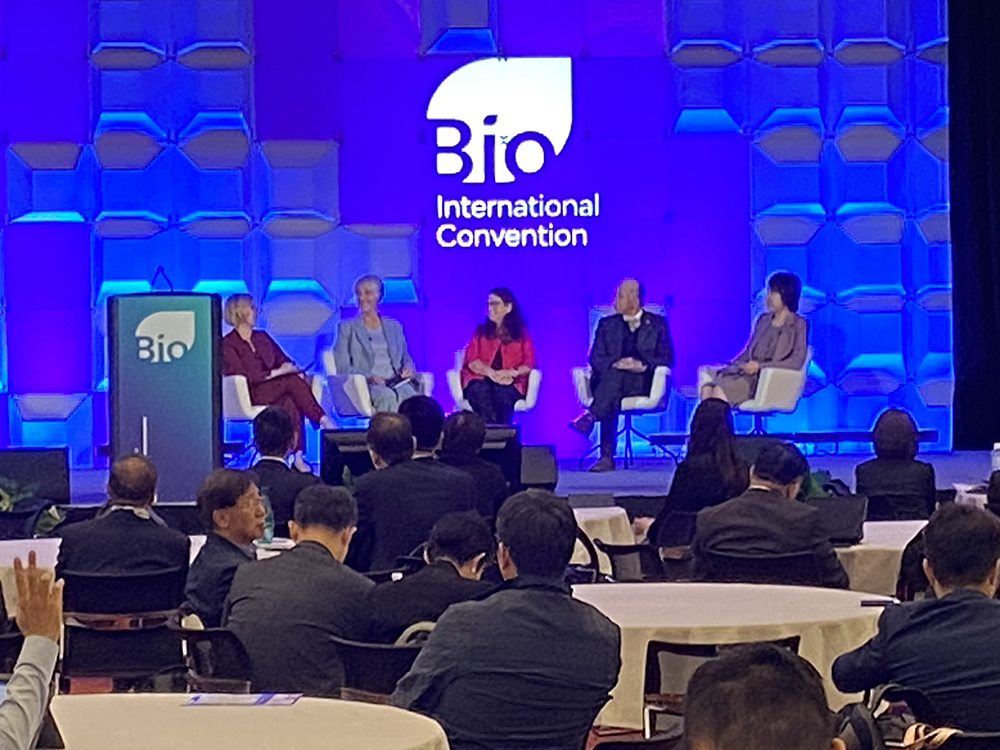Asian-Pacific countries and the United States are promoting biotech development through special programs to encourage their domestic industry combined with concerted efforts to attract foreign investors and innovators, said panelists at the opening session of the 2023 BIO International Convention’s APAC Summit on June 5.
“Independent innovation and global cooperation actually are two sides of the same coin. You cannot have one without the other,” said Jiao Dian, Economy and Commerce Counsellor for the Chinese Embassy to the United States.
Moderator Nancy Travis, Biotechnology Innovation Organization (BIO) VP of International Affairs, asked Dian and panelists from Australia, Japan, and the U.S. about how their countries are encouraging biotech.
Domestic support
“We all know that we’ve experienced a revolution in medicine in the last few years,” said Michelle Ouellette of the U.S. Commercial Service. She said the pandemic re-enforced the need for supporting biotech, and described U.S. government efforts to assist small and medium-sized enterprises (SMEs) and to work on strengthening supply chains.
“Australia has developed a biotechnology blueprint,” in an effort that began before the pandemic and has proved remarkably successful, said Lorraine Chiroiu, CEO of AusBiotech. “We were shocked to see that we had achieved 40% growth in two years.”
China, which has prioritized biotech in recent five-year economic development plans, has seen the effort bear fruit, according to Dian. “According to research, the growth rate of China’s biotech sector will be about 30 percent in the next 4-5 years.”
Japan also has a recent strategy for developing the sector, which was released in 2019, just before the pandemic, said Yoshiaki Tsukamoto, Executive Director of the Japan Bioindustry Association (JBA). This effort has been enhanced recently, he said, adding, “In the last two years, the Japanese government decided to set up supplements of about $10 billion for the biotech industry.”
Reaching across borders
Ouellette, who is from Massachusetts, noted that the local industry is engaged in a great deal of international cooperation, as are several federal agencies.
As far as the Commerce Department, they use their extensive network of international offices to engage in outreach to foreign partners and to support local companies through advocacy and advice in navigating foreign markets and commercial diplomacy. Meanwhile, the Commerce Department reaches out to foreign companies to attract them to the United States.
In China, “international cooperation in public health business has unprecedented importance,” said Dian. She said that the benefits for humanity mean that cooperation is not only about economic competition but about progress for all and encouraged everyone in the room to partake of partnering events coming up this fall.
The other panelists described ambitious outreach in Japan and Australia.
Special successes
“Clinical trials in Australia have grown explosively in the last few years,” according to Chiroiu, who said this was due to concerted government efforts to attract trials to the country through strong IP protections, tax incentives, and development of a strong research sector.
The U.S. success in supporting SMEs was noted by Tsukamoto, who said one reason he came from Japan to the convention was to learn more about how Japan can follow America’s success.
Ouellette said the U.S. achievements in helping startups was down to assistance from a range of government agencies, as well as a strong private ecosystem that includes academia, state biotech associations, and—of course—BIO.




